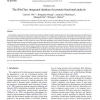Free Online Productivity Tools
i2Speak
i2Symbol
i2OCR
iTex2Img
iWeb2Print
iWeb2Shot
i2Type
iPdf2Split
iPdf2Merge
i2Bopomofo
i2Arabic
i2Style
i2Image
i2PDF
iLatex2Rtf
Sci2ools
137
click to vote
CANDC
2004
ACM
2004
ACM
The iProClass integrated database for protein functional analysis
Increasingly, scientists have begun to tackle gene functions and other complex regulatory processes by studying organisms at the global scales for various levels of biological organization, ranging from genomes to metabolomes and physiomes. Meanwhile, new bioinformatics methods have been developed for inferring protein function using associative analysis of functional properties to complement the traditional sequence homology-based methods. To fully exploit the value of the high-throughput system biology data and to facilitate protein functional studies requires bioinformatics infrastructures that support both data integration and associative analysis. The iProClass database, designed to serve as a framework for data integration in a distributed networking environment, provides comprehensive descriptions of all proteins, with rich links to over 50 databases of protein family, function, pathway, interaction, modification, structure, genome, ontology, literature, and taxonomy. In partic...
Related Content
| Added | 16 Dec 2010 |
| Updated | 16 Dec 2010 |
| Type | Journal |
| Year | 2004 |
| Where | CANDC |
| Authors | Cathy H. Wu, Hongzhan Huang, Anastasia N. Nikolskaya, Zhang-Zhi Hu, Winona C. Barker |
Comments (0)

